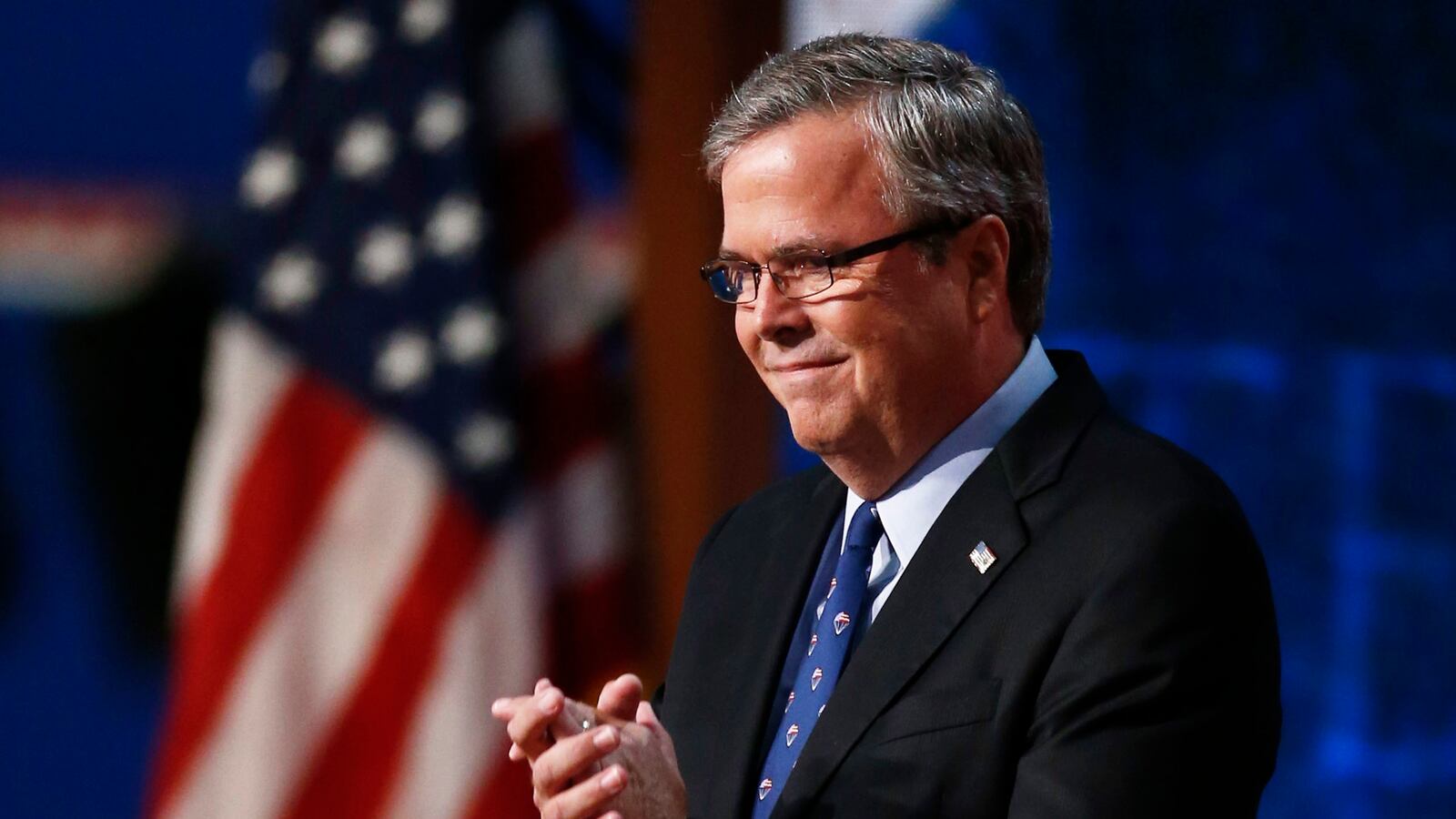Mitt Romney’s career as a private equity manager and expert “turnaround artist” was supposed to be a big asset in the 2012 election. Instead, it opened him up to attacks during both the general election and the Republican primary, with rivals like Newt Gingrich and Rick Perry portraying the former Bain Capital CEO as a “vulture capitalist” who laid off workers and picked companies’ bones clean.
So, if Jeb Bush is really considering a White House run in 2016, why is he in the private equity business now?
As other 2016 hopefuls go on book tours, shove themselves into the news cycle, and show up in early states, SEC filings reveal that Bush has quietly been working since at least 2013 as the chairman of Britton Holdings, LLC, a private equity firm based in Florida. The SEC disclosure filed last month is required once a firm has more than $100 million under management. For comparison’s sake, Romney’s Bain had more than $70 billion under management.
A recent Bloomberg report on both the SEC filings and Bush’s work with Britton Holdings is full of details you’d rather not have to explain as a Republican presidential candidate, particularly in a cycle when economic populism has gripped the GOP base. Conservative confabs now feature Ted Cruz slamming “the rich and powerful,” while Rand Paul warns of the folly of being the party of “fat cats, rich people, and Wall Street.”
While Cruz and Paul hammer Wall Street and rich guys, Bush’s partners in Britton Holdings include a former banker from the now-defunct Lehman Brothers, the high-flying Wall Street bank that collapsed just before the bailouts of 2008, as well as two former advisers to Credit Suisse. Among its investments, Britton Holdings is focusing some on shale oil and gas exploration, including the controversial practice of fracking. A major backer for one Britton Holdings investment is a Chinese conglomerate active in the energy sector.
Those don’t seem like the choices of a man preparing to face the microscopic scrutiny of a presidential campaign, but Steve Scheffler, a Republican National Committeeman for the Iowa GOP, doesn’t consider Bush’s private equity play a deal breaker for Iowa conservatives in 2016.
“I think it’s a non-issue. The only people making a big deal about it are Democrats and the media. When a Democrat with money runs, you never hear a word about it,” Scheffler told The Daily Beast. The bigger problem for Bush in Iowa, he said, will be Bush’s shifting position on immigration, which may or may not include a path to citizenship, and the fact that Bush hasn’t been making the rounds though the state the way Paul, Cruz, and other possible candidates have. “But as long as he gets in front of the other issue, the private equity, I don’t think it would be a problem.”
To Scheffler’s point, Romney’s troubles in 2012 were not inherently based on the fact that he worked in private equity. Polls leading up to the 2012 primary elections showed that voters, especially Republicans, believed that Romney’s business background would actually serve as an asset in the White House. A February 2012 Washington Post-ABC News poll showed four times as many Americans, 48 percent to 12 percent, calling Romney’s business experience a reason to support rather than oppose him.
But as the campaign wore on, Romney struggled to frame his work in private equity in a way that was anything but confusing and occasionally offensive to voters. From declaring, “I like being able to fire people,” to telling an ornery Iowan at the state fair, “Corporations are people, my friend,” and ultimately advancing his theory that 47 percent of Americans would vote for President Obama because they consider themselves “victims,” Romney’s image morphed from competent businessman to a caricature of an out-of-touch, almost cruel robber baron.
As the general election reached full force, Democrats exploited Romney’s ties to Bain, whether he had been involved in specific Bain decisions or not. In one ad blitz, former employees at a closed steel mill call Romney and Bain job destroyers and economic vampires. “They came in and sucked the life out of us,” said one steelworker.
By Election Day, the words “Romney” and “Bain” had become closely associated with a broken economic system that put profits ahead of ordinary people. Of all of the segments of the electorate that Romney lost, one of the largest margins came among people who wanted a president who “cares about people.” Romney lost those voters to Obama 18 percent to 81 percent.
Two years later, Republicans again find themselves with a wide-open field and a potentially strong national candidate in Bush—who now has a private equity job at the top of his resume.
But the biggest problem for Republicans, particularly establishment Republicans who are still looking for a 2016 standard bearer, isn’t the fact that Bush is in the business of making money, just as Romney was. Bush’s two terms as Florida governor, his family legacy, and his own work on immigration would likely play a larger role defining him as a candidate than buying a portion of an oil shipping company through an investment firm.
Instead, establishment Republicans’ biggest problem is that private equity is perhaps the last business Bush would join if he really wanted to be president in 2016.





